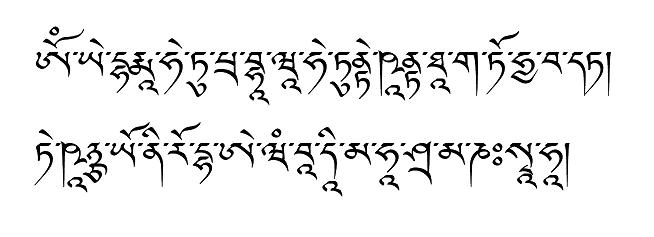Essence of Dependent Origination dharani: Difference between revisions
(Tibetan.) |
m (→Notes) |
||
| (7 intermediate revisions by 3 users not shown) | |||
| Line 1: | Line 1: | ||
[[Image:Ye dharma.JPG|frame|ye dharma transliterated in Tibetan using Sogyal Rinpoche's calligraphy]] | [[Image:Ye dharma.JPG|frame|ye dharma transliterated in Tibetan using [[Sogyal Rinpoche]]'s calligraphy]] | ||
'''Essence of | '''Essence of [[dependent origination]] [[dharani]]''' (Skt. ''Pratītyasamutpādahṛdaya''; Tib. རྟེན་འབྲེལ་སྙིང་པོ་, [[Wyl.]] ''rten 'brel snying po'') aka '''Yé Dharma''' — this is the statement which [[Shariputra]] heard from the monk [[Ashvajit]] when asking for a summary of the teachings of the [[Buddha]].<ref>This event and statement can be found in ''[[The Chapter on Going Forth]]'', 1.292, available in English translation at [https://read.84000.co/translation/toh1-1.html 84000].</ref> Shariputra passed the message onto his close friend [[Maudgalyayana]] and together they became followers of the Buddha, and went on to become his foremost disciples. | ||
''ye dharmā hetu prabhavā hetun teṣāṃ tathāgato hy avadat teṣāṃ ca yo nirodha evaṃ vādī mahāśramaṇaḥ'' | ''ye dharmā hetu prabhavā hetun teṣāṃ tathāgato hy avadat teṣāṃ ca yo nirodha evaṃ vādī mahāśramaṇaḥ'' | ||
[[Khenpo Ngakchung]] explains that when it is used as a [[mantra]], oṃ is added at the beginning for auspiciousness and svāhā at the end for the sake of stability. | [[Khenpo Ngakchung]] explains that when it is used as a [[mantra]], oṃ is added at the beginning for auspiciousness and svāhā at the end for the sake of stability. | ||
==Translation== | |||
" | "The [[Tathagata]] proclaimed the cause <br> | ||
of those phenomena that arise from causes, <br> | |||
as well as their cessation.<br> | |||
Thus taught the Great [[Shramana]]."<br> | |||
==Quotation from the sutras== | |||
{{:Quotations: Interdependent Origination}} | {{:Quotations: Interdependent Origination}} | ||
==Notes== | |||
<small><references/></small> | |||
[[Category:Mantras]] | [[Category:Mantras]] | ||
[[Category:Dharanis]] | |||
Latest revision as of 23:19, 6 February 2022

Essence of dependent origination dharani (Skt. Pratītyasamutpādahṛdaya; Tib. རྟེན་འབྲེལ་སྙིང་པོ་, Wyl. rten 'brel snying po) aka Yé Dharma — this is the statement which Shariputra heard from the monk Ashvajit when asking for a summary of the teachings of the Buddha.[1] Shariputra passed the message onto his close friend Maudgalyayana and together they became followers of the Buddha, and went on to become his foremost disciples.
ye dharmā hetu prabhavā hetun teṣāṃ tathāgato hy avadat teṣāṃ ca yo nirodha evaṃ vādī mahāśramaṇaḥ
Khenpo Ngakchung explains that when it is used as a mantra, oṃ is added at the beginning for auspiciousness and svāhā at the end for the sake of stability.
Translation
"The Tathagata proclaimed the cause
of those phenomena that arise from causes,
as well as their cessation.
Thus taught the Great Shramana."
Quotation from the sutras
དེ་རྒྱུ་དེ་བཞིན་གཤེགས་པས་གསུངས། །
རྒྱུ་ལ་འགོག་པ་གང་ཡིན་པ། །
All dharmas originate from causes.
The Tathagata has taught these causes,
And also that which puts a stop to these causes—
This too has been taught by the Great Shramana.
Notes
- ↑ This event and statement can be found in The Chapter on Going Forth, 1.292, available in English translation at 84000.